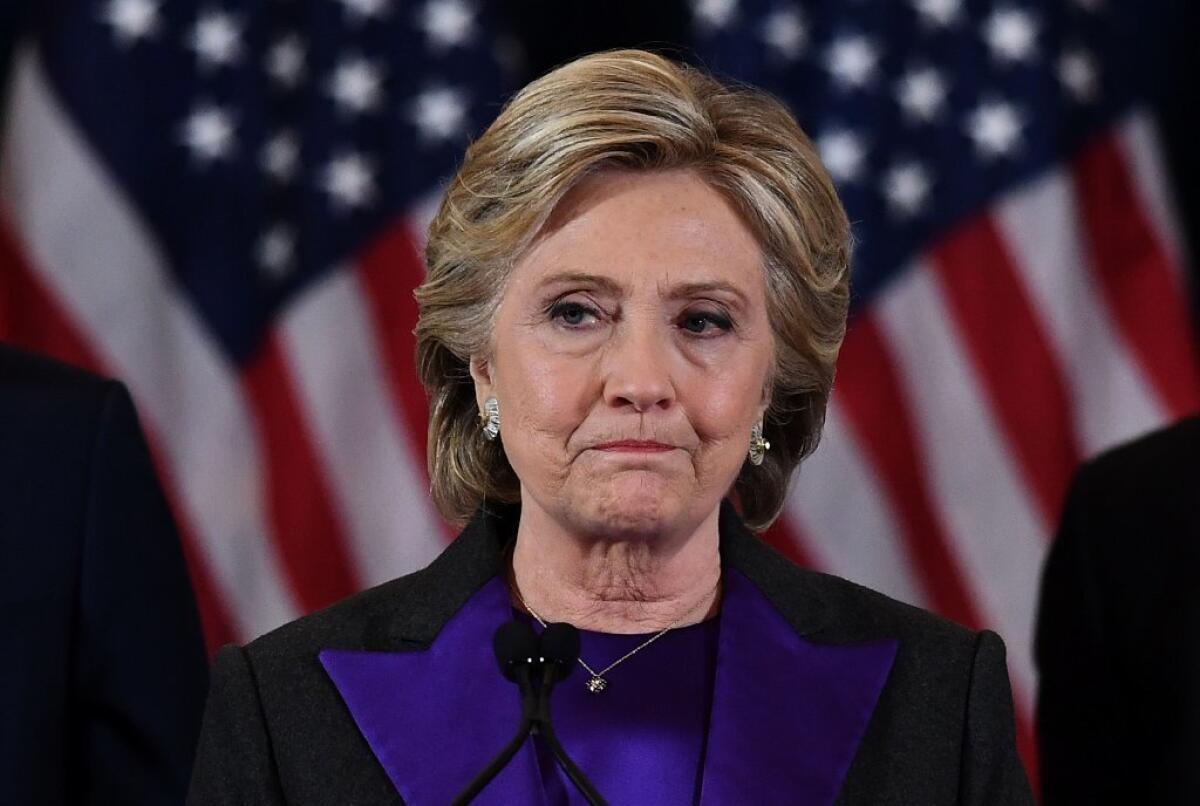Column: The never-ending election: How to stop recurring campaign donations

Hillary Clinton won the popular vote by at least 2.8 million, according to a final tally. The result marked the biggest gap between the popular vote and the electoral college in almost 150 years.
Terry Hendricks supports Hillary Clinton — up to a point.
The Fullerton resident thinks that point was reached Nov. 8 when Clinton lost the presidential election to Donald Trump. Hendricks, 69, reckons that her recurring $10 monthly contributions to the Hillary Victory Fund should have come to a halt once the contest was decided and the candidate stopped running.
Last week, however, the fund helped itself to another $10 credit-card payment, and Hendricks is worried that the contributions may never end.
She said she’s made over two-dozen calls: to the fund, to her bank, to the Democratic National Committee, to the Federal Election Commission. Either she got no response or she was informed that there was nothing to be done.
“I realize it’s only $10 a month,” Hendricks told me. “But it’s upsetting that I can’t stop it and I don’t even know where the money is going.”
Other political donors and would-be donors should know this: Such behavior by a major campaign is unusual.
“It’s extremely out of the ordinary,” said Taryn Rosenkranz, a Washington, D.C., fundraising consultant who specializes in Democratic campaigns but played no role in the Hillary Victory Fund. “Typically, nothing is processed after the election.”
What’s striking here, therefore, is the profound difficulty Hendricks has faced in communicating with someone who could address her issues.
As with all customer-service horror stories, this speaks to an institutional failure and an inability to treat those you count on — in this case, voters — with appropriate courtesy and respect.
The Clinton campaign’s shortcomings are no different from a business forcing customers to navigate a complex phone tree and then being kept on hold for a half-hour (or longer).
The Hillary Victory Fund was established last year as a joint fundraising effort by the campaign, the Democratic National Committee and about three-dozen state Democratic committees. California’s state party ran its own fundraising operation.
According to the Center for Responsive Politics, the Hillary Victory Fund amassed a war chest of more than $473 million. Much of that went to Clinton’s campaign but millions also were disbursed to state Democratic causes nationwide.
California businesses were among the top donors. DreamWorks SKG, the production company co-founded by Steven Spielberg, led the pack with $1.6 million in contributions to the fund.
It was followed by Santa Monica’s Saban Financial Group ($1.5 million); the investment firm Pritzker Group, which has a growing Los Angeles presence ($1.4 million); and Apple ($1.2 million).
Hendricks, a retired teacher, said she decided to set up a recurring monthly donation over the summer, after receiving an email from Clinton’s campaign offering T-shirts for sale. A solicitation for contributions accompanied the sales pitch.
“It was something I could do,” Hendricks recalled, “and it was easier to give $10 a month instead of a large amount at once.”
Clinton lost the election. “I just assumed that the donations would immediately stop,” Hendricks said, not unreasonably.
Then came last week’s credit-card payment. Hendricks promptly called the number on her statement for the Hillary Victory Fund and got a recording saying that all representatives were busy and instructing her to leave a message. She did. Nobody called back.
“I must have called 27 times,” she said. “Each time I left a message and each time I was ignored. It was like they’d all packed up and gone home.”
I called the same number and similarly heard a recording that everyone was really busy and that if I left a message someone would get back to me. No one did.
I also called the number listed on the fund’s official paperwork and left a message there. No response.
Hendricks said she called the Democratic National Committee, but a representative insisted that the committee had no control over fund matters. Hendricks reported the problem to the Federal Election Commission, but it too had no ready solution.
More troubling is what happened with her card issuer, Bank of America. Hendricks said she spoke with two bank representatives and both said they couldn’t stop the payments.
This was flat-out wrong.
“Customers can call us to put a stop on recurring payments,” said Betty Riess, a bank spokeswoman, adding that she didn’t know why Hendricks wasn’t told this.
Even when the payee won’t stop helping itself to your cash — for a canceled gym membership, say, or a canceled telecom service — your bank has the power to erect a financial firewall. If a customer rep won’t do it, ask for a supervisor.
I’m thinking it also should be a law that no recurring political contributions to a candidate be permitted to continue after election day. The candidate’s campaign should have to make the opt-out process transparent and should be required to respond in a timely fashion to all inquiries.
If you click any of the donation links on Clinton’s campaign website, HillaryClinton.com, you’ll be automatically transferred to a site run by the Democratic Party encouraging you to donate money “to help us stand up to Trump and the GOP.”
The day before the election, Hendricks received an email from the Clinton campaign thanking her for her support. It noted that recurring contributions would be automatically charged to her credit card “for the length of the campaign.”
The switcheroo with the websites suggests that Clinton’s campaign continues, one way or another.
That may be fine with many donors. But it’s not what Hendricks, and probably numerous others, signed up for.
Oh, and she heard from BofA late Thursday that the bank has cut off the Hillary Victory Fund from any further payments and secured a $10 refund for the last charge. That’s how it’s done.
David Lazarus’ column runs Tuesdays and Fridays. He also can be seen daily on KTLA-TV Channel 5 and followed on Twitter @Davidlaz. Send your tips or feedback to david.lazarus@latimes.com.
MORE BUSINESS NEWS
Tech stocks and big dividend payers rise, but rally fades for oil and banks
Ford recalls 680,000 cars; seat belts may not hold in crash
U.S. economy creates 178,000 jobs in November; jobless rate drops to 4.6%



